UAPA accused and Kerala journalist Sidhque Kappan’s Habeas Corpus plea was filed within 24 hours of his arrest on 6 October last year, however over six months after the matter is still pending in the Supreme Court.
“We challenged that his imprisonment was unlawful. Six adjournments have happened ever since we moved court. The plea was supposed to be listed on 9 March for final disposal, but it was eventually not heard. It has been over a month now that we are waiting for it to be listed again and over two months since the last hearing happened,” Sidhique Kappan’s lawyer Wills Mathews told The Quint.
A Habeas Corpus plea is a writ used to challenge the unlawful detention or imprisonment of a person under Article 32 of the Constitution. It is meant to protect the fundamental rights of a person.
We spoke to Kappan’s lawyer and legal experts to ascertain:
- Is This 6-Month Delay in Hearing Habeas Corpus Plea Normal?
- Now That UP Police Has Filed a 5,000 Page Charge Sheet Against Kappan, What Happens to the HC Plea?
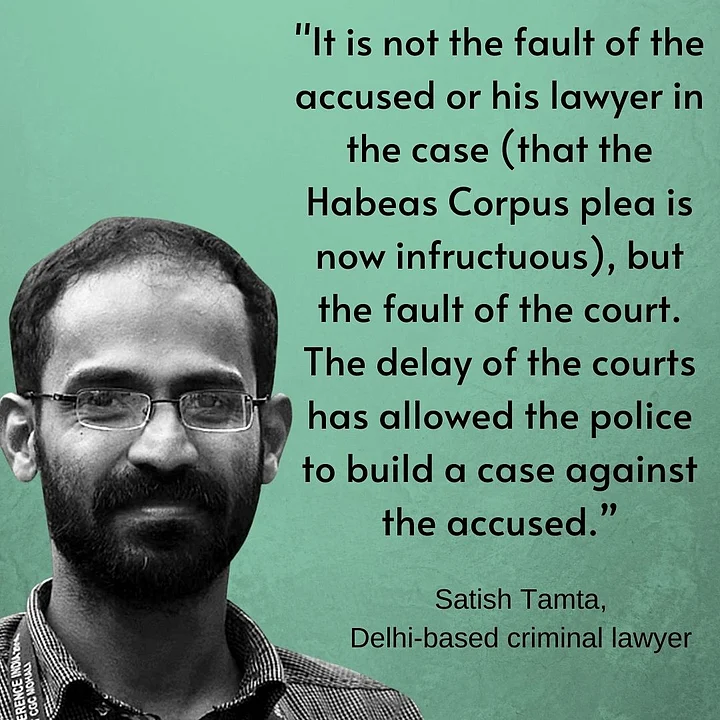
But before we get to that let’s see the...
Brief Facts of the Case
UP police picked Sidhique Kappan up on 5 October when he was on his way to west UP’s Hathras to report on the case of a 19-year-old Dalit woman who was allegedly gang raped by four men before succumbing to her injuries.
They claim that he was on his way with a “very determined design to create caste divide and disturbing law and order situation” in the area. That he, and the three others arrested with him, have links to the Popular Front of India (PFI), which is still not a banned organisation in India, but is often referred to as a successor to the banned Students Islamic Movement of India (SIMI).
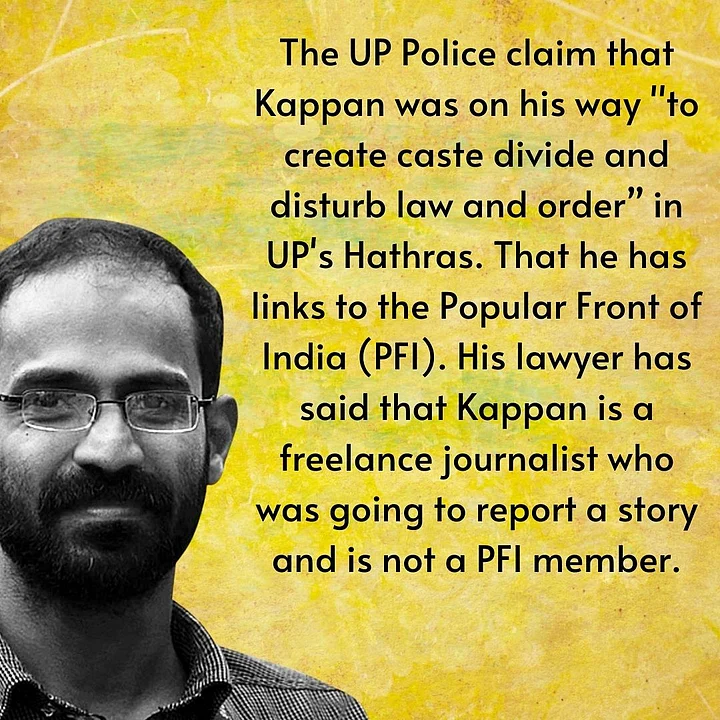
He and his lawyers have maintained that he was going to report on the case as a freelance journalist. “He is not a member of the PFI,” his lawyer Mathews said.
He has been lodged in a jail in Mathura and his wife has repeatedly told the media that Kappan was regularly tortured and abused while in their custody.
While the Habeas Corpus plea continued to be pending in the Supreme Court, a charge sheet was filed against him on 2 April by UP Police under the sections of 124A (sedition), 153-A (promoting enmity)n 295-A (outraging sentiments), Section 17 of the stringent anti-terror law called UAPA (punishment for raising funds for a terrorist act) and relevant sections of the IT Act on 2 April.
‘Waiting for a Hearing Since 22 January’: Kappan’s Lawyer
While there are no hard and fast rules on the timeline to hear a Habeas Corpus plea in court, the concept behind the Habeas Corpus is that has to be heard as a matter of urgency.
In the hearing in the same case on 16 November last year, Chief Justice of India SA Bobde had stirred a controversy when he made an oral observation while hearing Kappan’s plea, that the Supreme Court was “trying to discourage Article 32 petitions”.
Kappan’s lawyers have been waiting for a hearing since 22 January, when the court adjourned the matter and then the order showed the next date for the hearing 6 weeks later. That would have been 9 March, but despite the order the matter was not listed on the day.
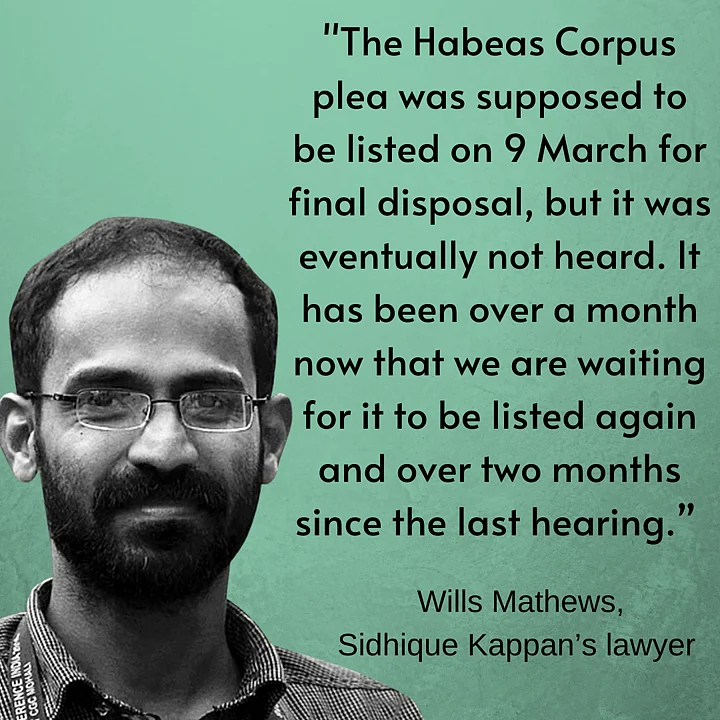
“From time immemorial, when it comes to Habeas Corpus petitions it is always a duty on the part of the court to list the matter on priority,” Mathews added.
“Whenever a person is under illegal detention, any friend of the accused can file a Habeas Corpus plea in any constitutional court, of the choice of the friend of the accused, under Article 226 (in the High Courts) and Article 32 (in the Supreme Court) of the Constitution of India. In this case, his friends and near ones are in Kerala and Delhi and the case is from Uttar Pradesh, hence we moved Supreme Court. As his arrest is in connection with his discharge of duty as a journalist, so there are larger issues involved. These are concerning the freedom of media, which is the breath of democracy.” Mathews also explained that he moved the Supreme Court in the instance that if technical concerns are brought up, then he will ask the court to invoke Article 142 to ensure complete justice.
Is This 6-Month Delay in Hearing Habeas Corpus Plea Normal?
Renowned criminal lawyer in Delhi, Satish Tamta, said this delay was extremely problematic. “When any person is denied of his ‘Life and Personal Liberty’ (Fundamental Rights) he approaches the High Court or the Supreme Court. Deprivation of fundamental rights cannot and should not happen even for a second.”
Similarly advocate and scholar Gautam Bhatia told us the delay was extremely abnormal. “The writ of habeas corpus is one of the cornerstones of the legal system. Literally meaning “produce the body”, it is invoked when the State illegally abducts and detains an individual.” He added:
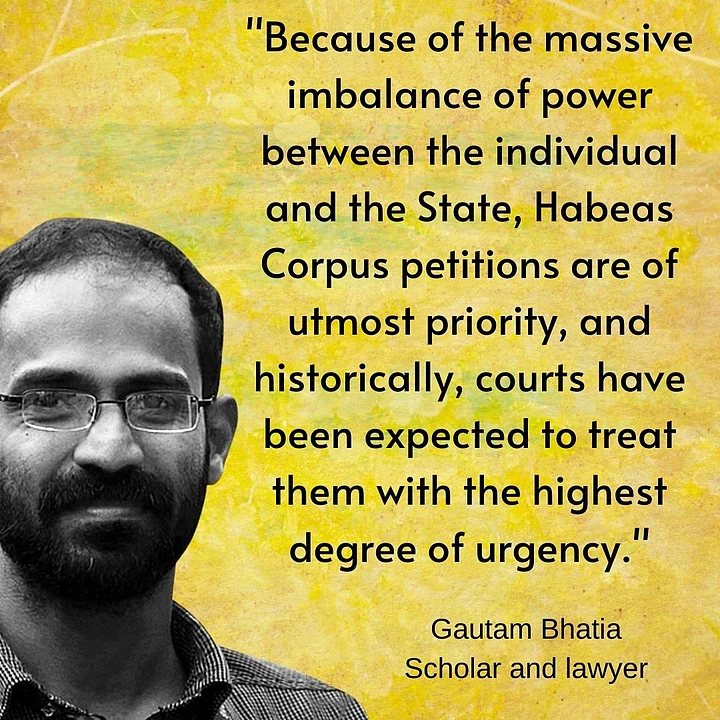
Abhinav Sekhri, lawyer practising in Delhi, said that while the delay could be due to many factors, it is difficult to say what led to this especially this year with COVID-19 playing haywire with court listings. “But even accounting for that, it is not normal and nor should it be normal for Habeas hearings to take this long,” he said, adding:
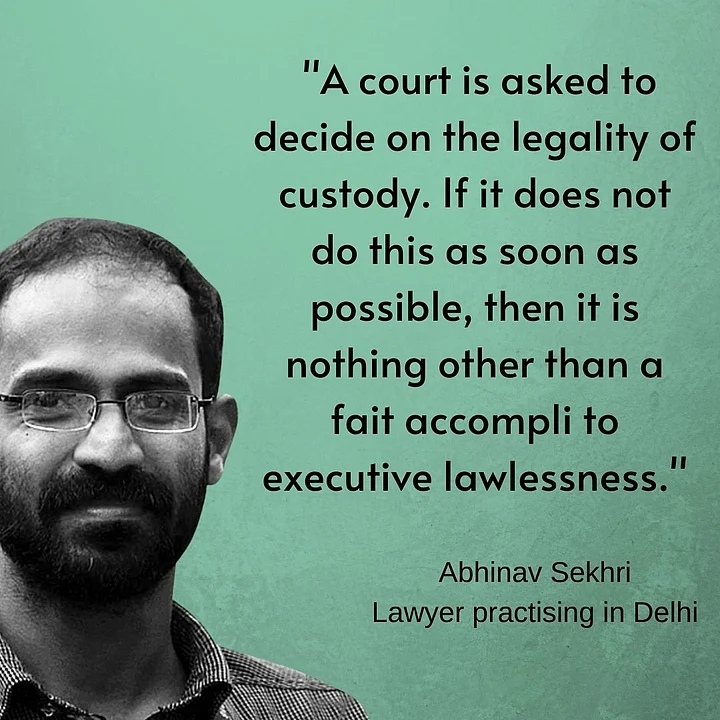
While there are no hard and fast rules on the timeline to hear a Habeas Corpus plea in court, the concept behind the provision itself is that it must be heard urgently. For instance, as India's law on Habeas Corpus originated in the English courts, many of those judgments are often cited and referred to by Indian courts when they are looking at such cases. One such is renowned English judge and jurist said Lord Denning, who said, “Whenever one of the King’s judges takes his seat, there is one application which by long tradition has priority over all others. Counsel has but to say, ‘My lord, I have an application that concerns the liberty of the subject’ and forthwith the judge will put all matters aside and hear it. It may be an application for a writ of habeas corpus, or an application, for bail, but, whatever form it takes, it is heard first.”
Now That UP Police Has Filed a 5,000 Page Charge Sheet Against Kappan, What Happens to the Habeas Corpus Plea?
Mathews hopes there will be some relief from the Supreme Court despite the charge sheet being filed, “The question is to see if my client was illegally detained or not. There was no delay in our part to move the application, then why should we suffer due to this delay?”
Tamta and Bhatia were of the view that the Habeas Corpus plea in the Supreme Court was infructuous now. Tamta said:

He goes on to add that this however is not the fault of the accused or his lawyer in the case, who moved the court within a day of him being detained, but the fault of the court and the delay in adjudicating on the said Habeas Corpus plea. “The delay of the courts has allowed the police to build a case against the accused,” Tamta concludes.
Bhatia added that in the context of a charge sheet being filed against Kappan, looking ahead, he and his lawyers would have to move the court to quash the charges and apply for bail. “Since a habeas corpus plea is made when a detention is — quite literally — "without the authority of law", once there exists a charge sheet that has invoked certain criminal legal provisions against an accused, technically, it is no longer extra-legal detention. If the charges are frivolous and contrived, an accused would normally move the court to quash them, and for bail,” he said.
Speaking about how Kappan’s custody has been extended every few weeks, Sekhri said, “Not filing of the charge sheet, but every single hearing extending custody of Kappan in the interim has potentially weakened the Habeas Corpus plea as per how the law is understood in India. This is because a competent judge has on each occasion extended his custody and thus declared there was nothing illegal about it.”
(At The Quint, we are answerable only to our audience. Play an active role in shaping our journalism by becoming a member. Because the truth is worth it.)
